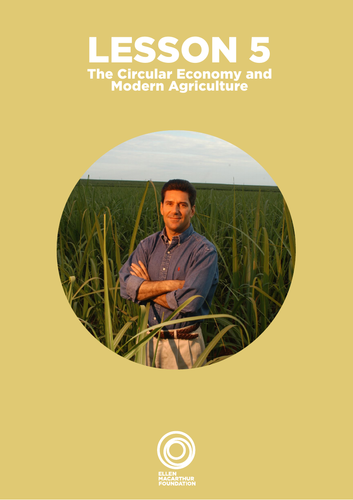

This lesson is part of a 5-part series introducing the circular economy and systems thinking.
Changing our food systems to one based on the principles of the circular economy is one of the most powerful things we can do to fight climate change and restore biodiversity. When achieved we can provide healthy and nutritious food for all.
This lesson focuses on the circular economy and modern agriculture. By the end of the lesson students will be able to understand the challenges around conventional monocultures, explore the importance of seeing the whole system when designing solutions, and critically evaluate the challenges in modern agriculture and securing food supply for the future.
Subject: Economics, Geography, Environmental Systems, Biology, Chemistry
Age range: 12-19 years
Total time: 45-70 minutes
Learning Outcomes:
• To understand the challenges around conventional monocultures and soil quality
• To explore the importance of seeing the whole system when designing solutions
• To critically evaluate the challenges in modern agriculture and securing food
supply for the future.
About the Circular Economy
The circular economy is a new way to design, make, and use things within the limits of our planet. In the natural world, materials and nutrients cycle continuously, allowing the Earth’s biosphere to regenerate and for all lifeforms - humans included - to flourish. This insight lies at the heart of the circular economy. Instead of using things for a short time before throwing them away, in a circular economy everything is designed to fit within a cycle so it can be used again and again.
The concept is based on three principles, driven by design, and underpinned by a transition to renewable energy:
1 - Eliminate waste and pollution
2 - Keep products and materials in use
3 - Regenerate natural systems
Using these principles, we can create a system that restores biodiversity, addresses climate change, and makes the most of our planet’s limited resources. Such a system could work for the economy, society, and environment - making it a truly sustainable model for our future prosperity.
About the Ellen MacArthur Foundation
The Ellen MacArthur Foundation, an international charity, develops and promotes the idea of a circular economy in order to tackle some of the biggest challenges of our time, such as plastic pollution, climate change, and biodiversity loss. We work with, and aim to inspire, business, academia, policymakers, and institutions to mobilise systems solutions at scale, globally.
Something went wrong, please try again later.
This resource hasn't been reviewed yet
To ensure quality for our reviews, only customers who have downloaded this resource can review it
Report this resourceto let us know if it violates our terms and conditions.
Our customer service team will review your report and will be in touch.